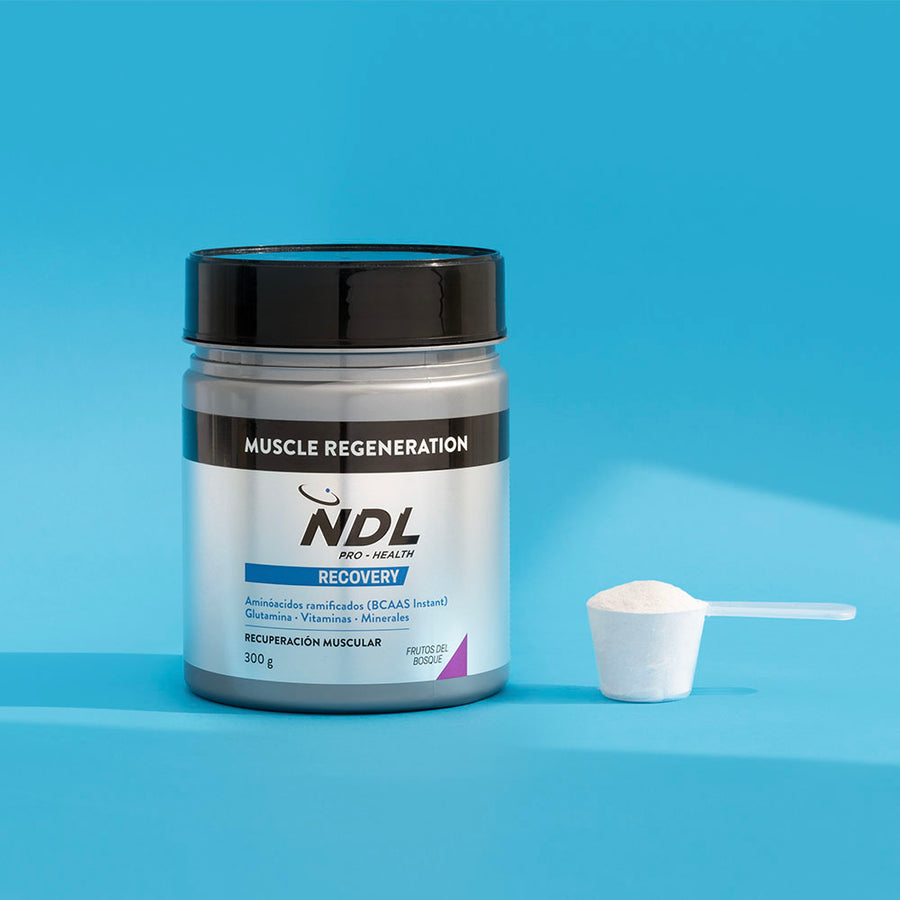Featured Products

Muscle Regeneration
See productGlutamine is a non-essential amino acid that, under certain circumstances of stress or physical exhaustion, becomes essential due to the high demand of the organism.
It is one of the most abundant amino acids in plasma and muscles, which plays crucial roles in protein synthesis, immune support and above all, intestinal health.
How does glutamine benefit athletes?
Skeletal muscle contains approximately 60% L-glutamine, which underlines its importance for muscle function and for athletes in general.
Glutamine supplementation can be particularly beneficial for athletes, as it helps reduce muscle damage and accelerates recovery.
According to a study published in the *Journal of the International Society of Sports Nutrition*, supplementation with 6 g/day of glutamine for 40 days in basketball players resulted in significantly lower levels of markers of muscle damage compared to the placebo group.
Glutamine is a crucial source of energy for the cells of the intestine, known as enterocytes, and plays a vital role in maintaining the integrity of the intestinal barrier.
Intestinal permeability, also known as "leaky gut," can allow harmful substances to enter the bloodstream, contributing to various diseases. A recent clinical trial showed that supplementation with 15 g/day of glutamine along with a low FODMAP diet significantly improved irritable bowel syndrome (IBS) symptoms and intestinal integrity.
Glutamine also acts as an important source of energy for immune cells, including lymphocytes and macrophages. This is especially relevant during periods of intense physical stress, such as strenuous exercise, where immune function may be compromised.
One study found that levels of cortisol, a stress hormone, did not increase in athletes taking glutamine supplements, suggesting a protective effect on immune function.
When and how to take glutamine?
The typical dose of glutamine for adults varies between 5 to 10 grams per day, divided into several doses. For athletes, during periods of intense training, we recommend 10 grams per day, divided in 2 intakes. One in the evening and one in the morning.
Glutamine can be taken in powder form and has no flavor, so we can mix it with water, juice or protein shakes, or in the form of capsules or tablets. The ideal to reach the required amounts is to take it in powder form. In tablets we would have to take a lot of it.
Key times for glutamine supplementation
- Before Exercise: It can help reduce muscle damage and intestinal permeability that can even generate the stress of competition.
- After Exercise: Promotes muscle recovery and glycogen synthesis.
- Before Bedtime: Supports nighttime recovery.
Scientific evidence on glutamine for athletes
Although glutamine is generally safe and well tolerated, it is important to consider individual needs and consult with a healthcare professional before beginning any supplementation regimen. This is especially relevant for people with pre-existing health conditions or taking other supplements and medications.
Glutamine is a versatile amino acid with proven benefits for muscle, gut and immune health. Its supplementation can be particularly valuable for athletes and people under intense physical and psychological stress.
Scientific evidence supports its use in improving post-exercise recovery and intestinal health, highlighting its importance in maintaining body homeostasis.
References
- *Journal of the International Society of Sports Nutrition*, 2023. "Effects of Glutamine Supplementation on Muscle Damage and Recovery in Basketball Players".
- *Clinical Nutrition*, 2022. "Impact of Glutamine Supplementation on Intestinal Permeability and Symptoms in Patients with Irritable Bowel Syndrome".
This article provides a comprehensive overview of the benefits of glutamine backed by scientific evidence, highlighting its relevance in sports and gut health contexts.

I have a diploma in Nutrition and dietetics from CESNID (University of Barcelona), a degree in Nutrition from Kin's College University of London, a postgraduate degree in Sports Nutrition and PNIE (Psychoneuroimmunoendocrinology) from the University of Barcelona, and a diploma in Ayurveda Nutrition, energy cooking and Naturopathy. Course Sport Nutrition at the Natural Gourmet Institute for Health and culinary arts in New York and co-owner of Ametlla + de Mallorca in Artà, I currently advise elite athletes and companies. Director of the nutrition department of Rafa Nadal Academy in Manacor and director of the master of Nutrition and sport of the University Alfonso X.

















